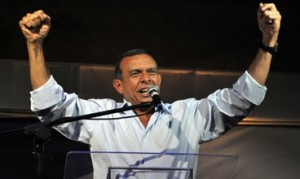
Mr Lobo, an opponent of ousted leader Manuel Zelaya, won some 56% of the vote, with turnout put at over 60%. The poll was held five months after Mr Zelaya was forced out at gunpoint, with an interim government taking over. The US has indicated it will accept the result but many Latin American nations say the election is not legitimate.
Leaders from Latin America, Spain and Portugal discussed their reaction to the vote at a Ibero-American summit in Estoril on Monday. “There are still many nations, especially in Central America, in vulnerable political situations. Brazil therefore must not recognise nor rethink the Honduran question,” Brazilian President Luiz Inacio Lula da Silva said.
Regional power Brazil is among those nations that have said they will not recognise any government installed after the election, arguing that to do so would legitimise the coup which ousted an elected president, and thus set a dangerous precedent.
President Lula has also made it clear that Mr Zelaya will remain in its embassy in the Honduran capital Tegucigalpa – where he has been living since he secretly returned to the country in September – until the government gave assurances for his safety.
The US, meanwhile, has indicated it will accept the election results. “Significant work remains to be done to restore democratic and constitutional order in Honduras, but today the Honduran people took a necessary and important step forward,” State Department spokesman Ian Kelly said in a statement as the results were coming in.
Mr Lobo comes from the centre-right opposition National Party, and was defeated by Mr Zelaya in the last presidential election in 2005. “I am announcing a government of national unity, of reconciliation. There’s no more time for divisions,” Mr Lobo said.
Mr Zelaya said the authorities had inflated turnout figures to try to give the election legitimacy. “He is going to be a very weak leader without recognition from the people and most countries,” Mr Zelaya told Reuters.
The BBC’s Stephen Gibbs in Tegucigalpa says the interim government will see the outcome – a clear winner and strong turnout – as strengthening their position that a refusal to accept the result goes against the will of the Honduran people.
Congress is due to vote on Mr Zelaya’s reinstatement on 2 December. His term ends on 27 January. Mr Zelaya was forced into exile on 28 June after trying to hold a vote on whether a constituent assembly should be set up to look at rewriting the constitution.
His critics said the vote, which was ruled illegal by the Supreme Court, aimed to remove the current one-term limit on serving as president and pave the way for his possible re-election.
Mr Zelaya has repeatedly denied this and pointed out that it would have been impossible to change the constitution before his term in office was up.